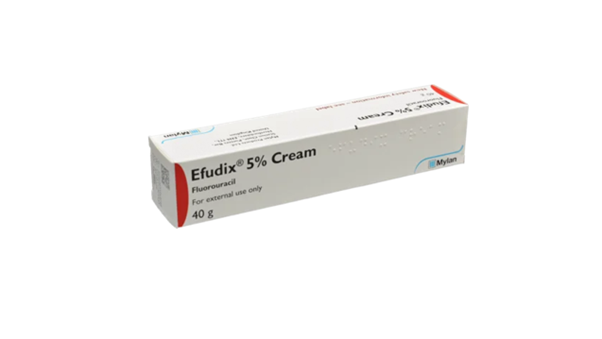Actinic Keratosis
Treatment
- On this Page</B.
- AK Treatment
- How our services work
- Understanding AK
- Different types of treatments
Actinic Keratosis Treatment
Actinic keratosis (AK) is a skin condition that develops due to long-term sun exposure. It appears as rough, scaly patches or small, crusty bumps on sun-exposed areas like the face, scalp, ears, hands, and forearms.
Actinic Keratosis Treatment
Actinic keratosis (AK) is a skin condition that develops due to long-term sun exposure. It appears as rough, scaly patches or small, crusty bumps on sun-exposed areas like the face, scalp, ears, hands, and forearms.
Efudix
Strength – 5% Fluorouracil
Available in 40g

£94.99
Solaraze
Strength – 3% Diclofenac Sodium
Available in 50g

£69.99
How It Works?

Online Consultation
Fill in a quick online consultation for our licensed pharmacists to review.

Choose a Treatment
Our pharmacists will review your treatment to ensure it’s suitable.

Quick & Discreet Delivery
Your treatment will be delivered to your door quickly & discretely.
Understanding Actinic Keratosis
Actinic keratosis (AK) is a skin condition that develops due to long-term sun exposure. It appears as rough, scaly patches or small, crusty bumps on sun-exposed areas like the face, scalp, ears, hands, and forearms. While usually harmless, AK can sometimes progress to skin cancer, making early treatment important.
What’s Happening in Your Skin?
Sun Damage: Over time, exposure to ultraviolet (UV) rays from the sun or tanning beds causes damage to skin cells. This damage builds up, leading to abnormal skin growth.
Skin Cell Changes: Healthy skin naturally sheds old cells and replaces them with new ones. But with repeated UV exposure, the skin’s repair process is disrupted, causing patches of rough, scaly skin to develop.
Precancerous Growth: Actinic keratosis is considered a precancerous condition. While most cases don’t turn into skin cancer, a small percentage can develop into squamous cell carcinoma, a common form of skin cancer.
Types of Actinic Keratosis
Classic AK: Small, dry, scaly patches that may feel rough to the touch.
Hypertrophic AK: Thicker, wart-like growths.
Pigmented AK: Darker spots that may resemble freckles or age spots.
Actinic Cheilitis: A form of AK that affects the lips, causing dryness, cracking, or white patches.
Common Causes and Risk Factors
Cumulative Sun Exposure: The more time you spend in the sun, the higher your risk.
Fair Skin: People with lighter skin tones, freckles, or red/blonde hair are more susceptible.
Age: Most cases occur in adults over 40, though younger people with high sun exposure can also develop it.
Weakened Immune System: Those with compromised immune function are at greater risk.
Why Treatment Matters
Even though actinic keratosis isn’t always harmful, it’s important to treat it to reduce the risk of progression to skin cancer. Fortunately, prescription-only treatments, such as topical creams and gels, can help remove damaged skin cells and encourage healthy skin regeneration.
At YourPharmacy, we offer a range of prescription-only treatments to effectively manage actinic keratosis. Speak to a one our independent prescribers today to find the best option for your skin.
Actinic Keratosis treatments
Several treatment options are available for managing actinic keratosis, including:
Medications
Prescription-Only Medications for Actinic Keratosis
Effective treatment for actinic keratosis often involves prescription-only medications that target abnormal skin cells, encourage healthy cell turnover, and reduce the risk of progression to skin cancer.
Topical Treatments:
Fluorouracil (5-FU) Cream – A chemotherapy-based cream that destroys abnormal precancerous cells by interfering with their DNA. It causes redness and peeling as damaged cells are eliminated.
Imiquimod Cream – Stimulates the immune system to attack and remove abnormal skin cells, promoting healing while reducing the risk of AK progressing to cancer.
Diclofenac Gel – A non-steroidal anti-inflammatory gel that helps eliminate actinic keratosis lesions by reducing abnormal cell growth with minimal irritation.
Ingenol Mebutate Gel – A fast-acting topical treatment that rapidly destroys damaged cells and triggers an immune response to clear affected areas.
Oral Medications:
Acitretin (Oral Retinoid) – Used in severe or widespread cases, acitretin helps regulate skin cell growth and reduce AK lesions. It requires close medical monitoring due to potential side effects.
Why Treatment is Important
Actinic keratosis can sometimes develop into squamous cell carcinoma, a form of skin cancer. Early treatment with prescription medications helps remove damaged cells before they become cancerous.



